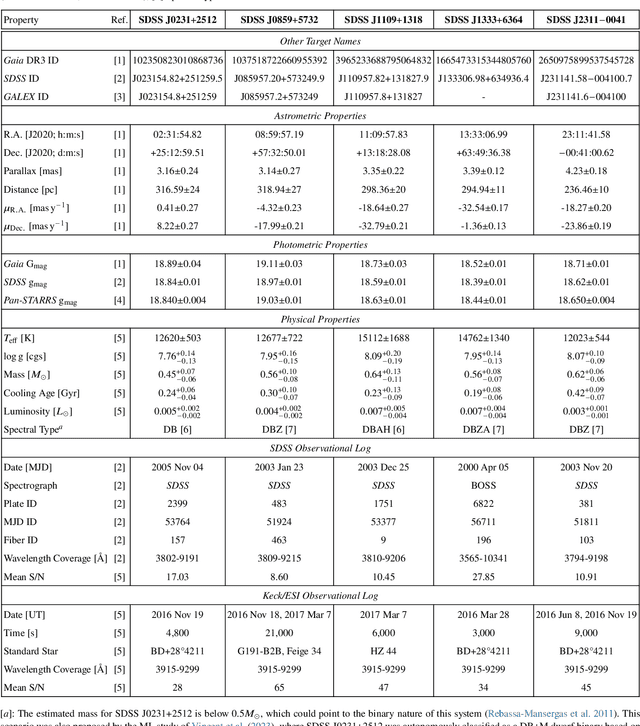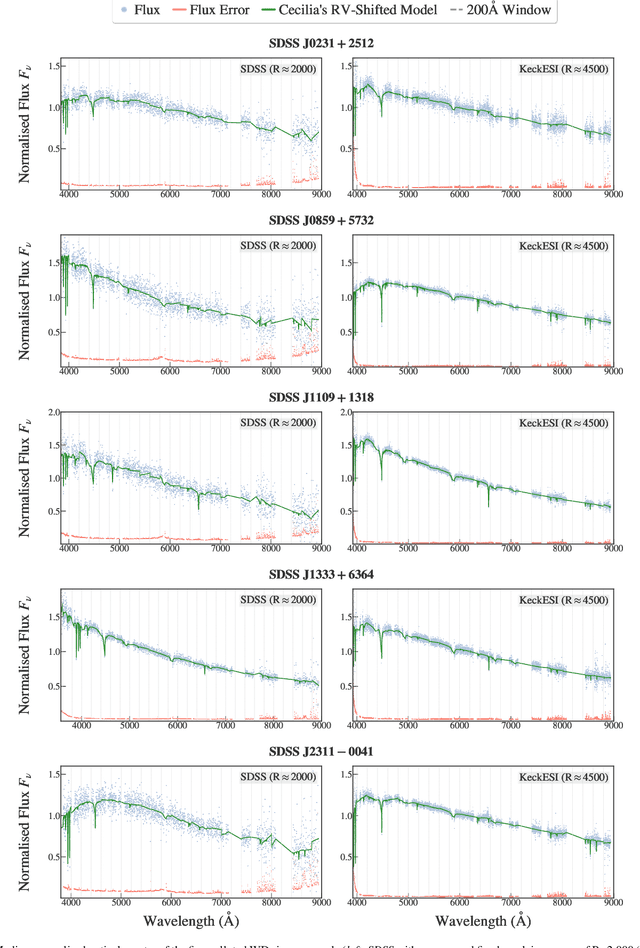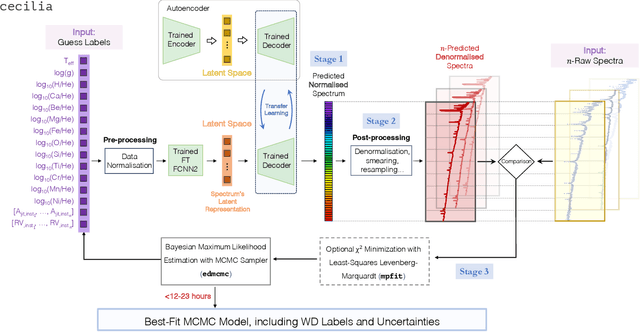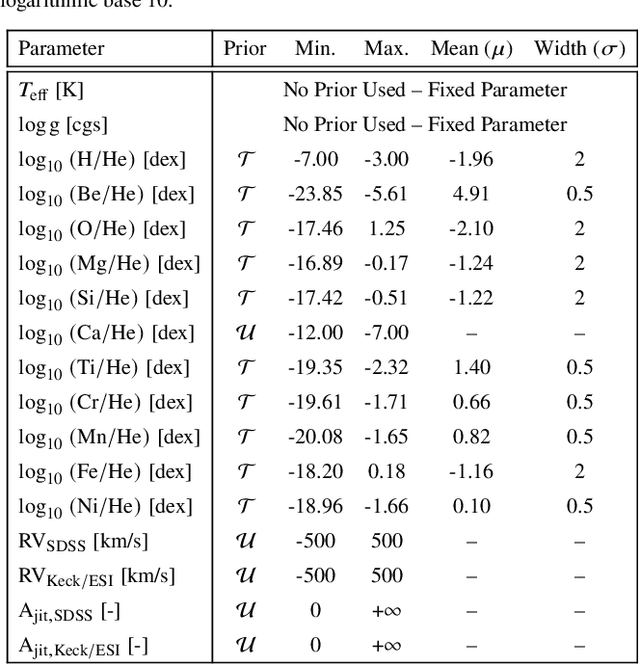Javier Viaña
Kavli Institute for Astrophysics and Space Research | Massachusetts Institute of Technology
A Machine-Learning Compositional Study of Exoplanetary Material Accreted Onto Five Helium-Atmosphere White Dwarfs with $\texttt{cecilia}$
May 09, 2025



Abstract:We present the first application of the Machine Learning (ML) pipeline $\texttt{cecilia}$ to determine the physical parameters and photospheric composition of five metal-polluted He-atmosphere white dwarfs without well-characterised elemental abundances. To achieve this, we perform a joint and iterative Bayesian fit to their $\textit{SDSS}$ (R=2,000) and $\textit{Keck/ESI}$ (R=4,500) optical spectra, covering the wavelength range from about 3,800\r{A} to 9,000\r{A}. Our analysis measures the abundances of at least two $-$and up to six$-$ chemical elements in their atmospheres with a predictive accuracy similar to that of conventional WD analysis techniques ($\approx$0.20 dex). The white dwarfs with the largest number of detected heavy elements are SDSS J0859$+$5732 and SDSS J2311$-$0041, which simultaneously exhibit O, Mg, Si, Ca, and Fe in their $\textit{Keck/ESI}$ spectra. For all systems, we find that the bulk composition of their pollutants is largely consistent with those of primitive CI chondrites to within 1-2$\sigma$. We also find evidence of statistically significant ($>2\sigma$) oxygen excesses for SDSS J0859$+$5732 and SDSS J2311$-$0041, which could point to the accretion of oxygen-rich exoplanetary material. In the future, as wide-field astronomical surveys deliver millions of public WD spectra to the scientific community, $\texttt{cecilia}$ aspires to unlock population-wide studies of polluted WDs, therefore helping to improve our statistical knowledge of extrasolar compositions.
LensNet: Enhancing Real-time Microlensing Event Discovery with Recurrent Neural Networks in the Korea Microlensing Telescope Network
Jan 10, 2025Abstract:Traditional microlensing event vetting methods require highly trained human experts, and the process is both complex and time-consuming. This reliance on manual inspection often leads to inefficiencies and constrains the ability to scale for widespread exoplanet detection, ultimately hindering discovery rates. To address the limits of traditional microlensing event vetting, we have developed LensNet, a machine learning pipeline specifically designed to distinguish legitimate microlensing events from false positives caused by instrumental artifacts, such as pixel bleed trails and diffraction spikes. Our system operates in conjunction with a preliminary algorithm that detects increasing trends in flux. These flagged instances are then passed to LensNet for further classification, allowing for timely alerts and follow-up observations. Tailored for the multi-observatory setup of the Korea Microlensing Telescope Network (KMTNet) and trained on a rich dataset of manually classified events, LensNet is optimized for early detection and warning of microlensing occurrences, enabling astronomers to organize follow-up observations promptly. The internal model of the pipeline employs a multi-branch Recurrent Neural Network (RNN) architecture that evaluates time-series flux data with contextual information, including sky background, the full width at half maximum of the target star, flux errors, PSF quality flags, and air mass for each observation. We demonstrate a classification accuracy above 87.5%, and anticipate further improvements as we expand our training set and continue to refine the algorithm.
Front-propagation Algorithm: Explainable AI Technique for Extracting Linear Function Approximations from Neural Networks
May 25, 2024Abstract:This paper introduces the front-propagation algorithm, a novel eXplainable AI (XAI) technique designed to elucidate the decision-making logic of deep neural networks. Unlike other popular explainability algorithms such as Integrated Gradients or Shapley Values, the proposed algorithm is able to extract an accurate and consistent linear function explanation of the network in a single forward pass of the trained model. This nuance sets apart the time complexity of the front-propagation as it could be running real-time and in parallel with deployed models. We packaged this algorithm in a software called $\texttt{front-prop}$ and we demonstrate its efficacy in providing accurate linear functions with three different neural network architectures trained on publicly available benchmark datasets.
Simulation-based Inference for Exoplanet Atmospheric Retrieval: Insights from winning the Ariel Data Challenge 2023 using Normalizing Flows
Sep 17, 2023Abstract:Advancements in space telescopes have opened new avenues for gathering vast amounts of data on exoplanet atmosphere spectra. However, accurately extracting chemical and physical properties from these spectra poses significant challenges due to the non-linear nature of the underlying physics. This paper presents novel machine learning models developed by the AstroAI team for the Ariel Data Challenge 2023, where one of the models secured the top position among 293 competitors. Leveraging Normalizing Flows, our models predict the posterior probability distribution of atmospheric parameters under different atmospheric assumptions. Moreover, we introduce an alternative model that exhibits higher performance potential than the winning model, despite scoring lower in the challenge. These findings highlight the need to reevaluate the evaluation metric and prompt further exploration of more efficient and accurate approaches for exoplanet atmosphere spectra analysis. Finally, we present recommendations to enhance the challenge and models, providing valuable insights for future applications on real observational data. These advancements pave the way for more effective and timely analysis of exoplanet atmospheric properties, advancing our understanding of these distant worlds.
 Add to Chrome
Add to Chrome Add to Firefox
Add to Firefox Add to Edge
Add to Edge